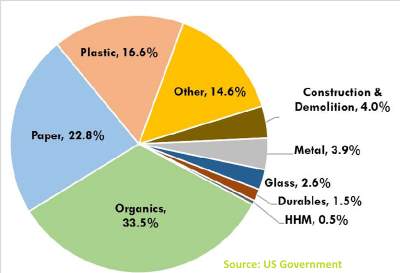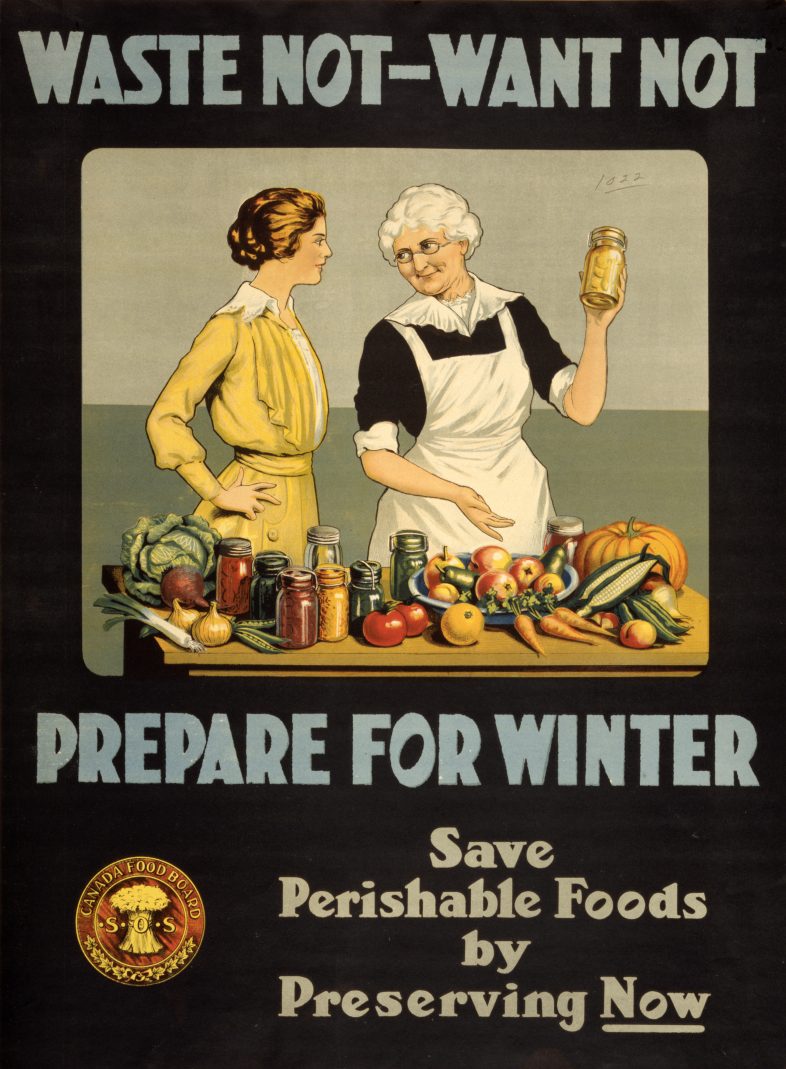
In this article, we discuss Food Waste Reduction. It's essential for preventing waste food from being sent to landfills, and how this eventual outcome makes action on food waste reduction before a ban is implemented ever more essential.
Reducing food waste has been quite reasonably seen in many countries as the next big step in the battle for improvements in waste management practice, without which:
- Further increases in recycling will become more difficult
- Landfills will continue to pose the same high risks of contamination of the environment as they do now. (There is a major threat from landfill leaks causing organic pollution from current landfills.)
It is a fact, that food waste is the single largest contributor to the organic pollution load held in today's landfills.
Watch our video below, in which we provide the UK waste food facts. They are so appalling that we say they should “freak-out” thoughtful people. What is your opinion? Scroll down below here as soon as the short video ends. We have a lot more on this subject for you to read – lower down on this page.
A large part of the organic content in municipal solid waste landfills (which by the way also produces the landfill gas), comes from food waste disposed of, in them.
Food waste reduction and keeping it out of landfills, has been in the news on both sides of the Atlantic on-and-off, for about the last 10 years. So far, only a few nations have introduced bans on food waste being sent to landfills. But, a recent EU report has been published identifying the fact that society is now producing up to 50% of its food only to throw it away! This is scandalous! Clearly, a lot more needs to be done to reverse the trend toward ever-rising food waste quantities.
The problem is that food waste occurs for so many reasons and at so many points, throughout the supply chain, that finding simple solutions to achieve food waste reduction is extremely hard.
The parts of this article that follow are a round-up of informative articles on banning food waste to landfills and food waste reduction, in the reverse order to that just provided.
In our first excerpt, it isn't a bad idea to start to make commercial food producers have to compost, or digest their food waste. In fact, many people have realized that food waste can, when the anaerobic digestion process is used, even produce a healthy revenue from food waste digestion in anaerobic digestion plants.
In the UK, some people within the food industry have also made the suggestion that food waste should be banned from landfills. The following article from the US publication South Coast today shows that others have been making similar proposals:
In the US efforts are underway to reduce and eliminate food waste:
“Save the Food San Diego” – A Campaign Aimed at Eliminating Food Waste
A new campaign aimed at eliminating food waste, Save the Food San Diego, kicked off on Tuesday (September 26, 2017). But some of the tools needed to achieve that goal, despite being mandated by changes to state law last summer, still weren't in place.
The national campaign focuses on convincing consumers to waste less food. The worst offenders, though, are commercial and industrial entities — schools, hospitals, restaurants, resorts, and other large venues. The alliance has been trying to bring these parties on board for a while and has three dozen partners, ranging from local city governments to venues such as the Del Mar Fairgrounds and Petco Park.
“Recent California legislation AB 1826 and SB 1383 require less food waste to enter landfills from businesses and residents. Although planning efforts are underway, in San Diego County we don't yet have the robust systems that we need to compost or digest food waste,”
Hamilton continued.
“This leaves us in a unique position, though, where we can work on waste reduction and donations as first steps before the needed infrastructure is finalised. That would be the preferred strategy, anyway.”
Preventing waste in the first place and diverting food that's likely to end up wasted to local food banks are at the top of an inverted pyramid prioritising these measures above using waste as livestock feed or composting material.
Assembly Bill 1826, known as Mandatory Commercial Organics Recycling, is the more specific of the two measures aimed at the latter objectives, noting the significant methane-gas emissions attributed to wasted food breaking down inside landfills. Beginning January 1, 2016, cities and counties across the state were directed to implement organics recycling programs. By April 1, businesses generating more than eight cubic yards per week of organic waste were to have recycling services in place; on January 1 this year, the law applied to businesses generating four cubic yards per week.
… Sadly, most [food waste] generators don't do a very good job of keeping food cleanly separated.”
Resource Management tries to solve this problem by providing containers small enough to sit inside commercial kitchens at the edge of prep tables, which once filled with plant waste are swapped out at a pallet-sized pod the company regularly empties; buy-in from businesses that should be following state law, however, has been slow.
“Today, there are very few facilities to take food waste for processing,” Ambroso continues. The composting facility at the Miramar landfill is running at full capacity, and while some waste is diverted to farms for their own compost or to feed animals, options locally on where to dump the food people do want to recycle, are limited.
Farm recycling, Ambroso says, is:
“By far the least expensive option and our hope is that local and state regulators and planners will encourage farmers to participate in these programs.
“Currently, food-waste recycling costs more than traditional trash service. Hence, commercial generators are hesitant to add that cost unless they're forced to comply with the law,”
Ambroso admits.
“Local governments are beginning to put more pressure on their commercial businesses and waste haulers, but more needs to be done. Unless there is a financial incentive, most won't do it.” via Wastedinlandfills.
If you had any doubt that the food waste problem is growing rapidly, and must be tackled, the following US article snippet shows how this is happening.
Amount of food waste in Iowa landfills nearly doubles

Members of a Department of Natural Resources study team sorted through garbage taken to landfills by the state’s largest cities and found tons of material that are being thrown out that could be recycled.
The DNR’s Tom Anderson oversaw the 2017 study conducted in October and says one thing stood out compared to the last study.
“Food waste has nearly doubled since 2011. Food waste is the most landfilled material in Iowa, and has been for each of the four studies that we’ve done,” Anderson says.
The study found food waste accounted for 20 percent of the materials going into the landfills and totaled 556,313 tons. While the amount of food being thrown out went up — researchers found less of common packaging material in the landfills. via Foodwastenearlydoubles
Food Waste Reduction – From Farm To Fork To Landfills
“Feel what it’s like to truly starve, and I guarantee that you’ll forever think twice before wasting food.”
– Criss Jami
Up to one-third of all food produced globally is lost or wasted every year.
A global paradox; the wasted food is enough to feed three times the entire malnourished population of the world.
Defined as “discarding or alternative (non-food) use of food that is safe and nutritious for human consumption along the entire food supply chain” by the FAO, food waste quantifies to 1.6 billion tons a year.
A significant cause of social setback, economic loss, and environmental deterioration, food waste translates into a waste of many ancillary elements, including labour.
A meal that doesn’t fit the mood – impromptu pizza run?
A meal that doesn’t appeal to the palate – log in to a food delivery app? A meal cooked in excess – refrigerator overload?
Food waste seeps into our lives inconspicuously. The plate of food that hits the bin embodies facets beyond the edible.
From farm to fork to landfill, food waste significantly contributes to global warming. The energy utilised in the production, transportation, and storage of food is a major part of the issue.
Adding to that the greenhouse gas emissions from landfills created for food waste are estimated to be 3.3 billion tons per year. If food waste were a country it would rank third worldwide in terms of greenhouse gas emissions, placing it between the United States of America and India. via FarmToForkT Landfills

The whole concept of food waste reduction will be hard to achieve. Banning food waste to landfills would be an even more contentious move.
But, let's not get despondent. If, as our poster suggests, in wartime food can be bottled by the nation's housewives with a little ingenuity today, the food industry should be able to adapt to zero waste to landfill policies.






This Was Very Helpful For Teaching My 5 Year Old About Landfill And What Happens Afterwards, Thank You!?
People need to stop buying products which are bad for the nature. Making green energies should be linked to recycling and reducing pollution. You can recycle cans, glass, paper and electronics. People must avoid using products containing chemicals and do not buy a packet meal from a brand that is obviously wasting resources in the packaging process. If all customers adopt this attitude, large firms will eventually change their habits. So we must put an embargo on buying packaged foods.
It’s not actual waste garbage. and people don’t sort because they don’t care enough.?
Utilized it with my high school course. Straightforward yet effective. As well as amused me. lol.
Used it with my secondary school class. Simple but powerful. And hilarious to some. lol?
The water bottle could also be made into a clutch purse. Great ideas here!?
Many landfills have the power plant to make electricity. I have seen them. If you remove the food the landfills won’t make the gas so this is a bad thing.